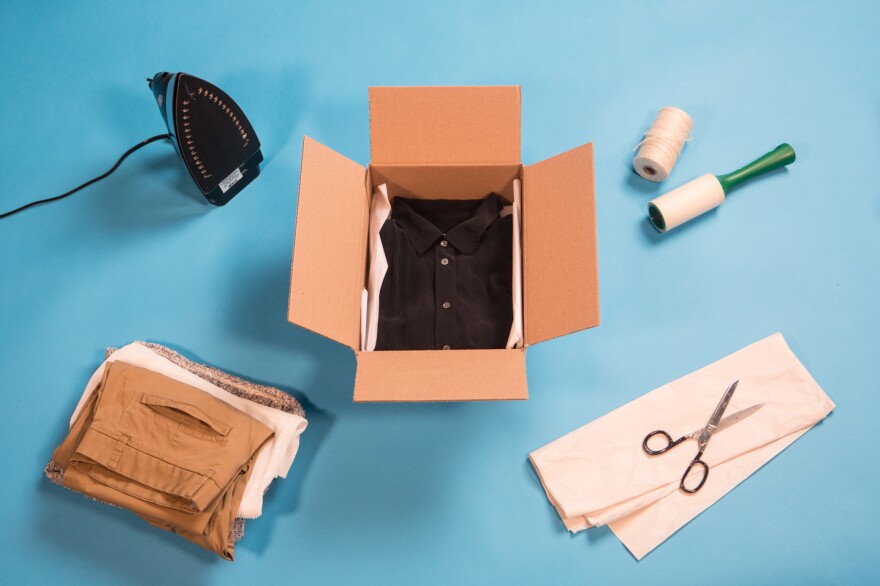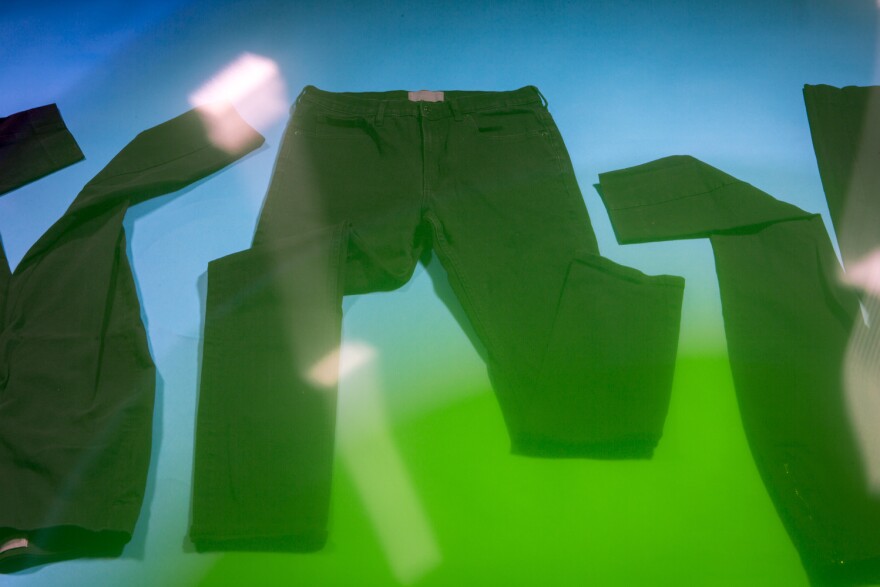Updated April 22, 2022 at 12:28 PM ET
When fashionable clothes can be so cheap, it can be easy to fill up virtual shopping carts just for the rush of the purchase. But this attitude of excess has led to mass over-production and a clothing waste crisis.
"Ultimately, any item of clothing that you get rid of is going to end up in the landfill because the technological solutions just really aren't at scale yet to do something different with it," says Elizabeth Cline, author of The Conscious Closet: A Revolutionary Guide to Looking Good While Doing Good.
Less than 1% of all clothing material is ever recycled back into new clothes. And of the clothes we donate to charity, only a fraction gets resold in stores. Much of what doesn't sell gets shipped in bulk and sold internationally.
The costs of fast fashion are huge to the environment and to the people making clothes. Each year the fashion industry consumes approximately 79 trillion liters of water and then throws out 92 million tons of waste. To make clothes so quickly and affordably, factory workers are often underpaid and operate in unsafe working conditions.
It can make us feel powerless, as individuals, to do something about it. But there are ways to shop smarter and to curate a more eco-and ethically conscious closet. Here are some takeaways the experts recommend:
1. Don't think of your clothes as disposable.
Symphony Clarke, known as the Thrift Guru on social media, has noticed that a lot of her peers feel pressure to keep up with trends online. Some even feel like they can't post a picture in the same outfit twice. "That's the lifespan of their clothing. Once a picture is taken, it's done," she says.
To abandon that attitude of excess, change your mindset! Buy with the notion that what you purchase should stay with you. Clarke recommends a 30-wear test: When shopping, ask yourself if you'd wear that item 30 times or more.
The other way to extend the lifespan of your clothing is with a little more TLC.
"Taking care of clothes...I think it can feed the soul. It's just a very good life skill to have," says Cline. (We have a Life Kit episode all about getting stains out.)
2. Revamp or "thrift flip" your clothing and accessories.
Clarke established her own personal style by revamping — taking something old and changing it up. She gives clothes a fresh feel by cutting them up or adding some new details.
"Go in your closet and say, hey, how can I switch up this old crewneck or this old hoodie that I had? Maybe I could cut it and crop it [into] a whole different item," Clarke suggests.
Watch YouTuber Nava Rose's revamps or search YouTube or TikTok for thrift revamps or thrift flips. One useful hashtag to search is #DIYnosew — so that no sewing is required.
3. Get rid of your clothing responsibly.

Marie Kondo's popular approach was to throw out that which no longer brought us joy. But be intentional about how you donate.
"It has a much, much higher chance of finding a second life [by] finding another person who's excited to wear it," Cline says.
For instance, you could organize a clothing swap with friends or sell your unneeded items on resale sites like ThredUp, Poshmark, Depop and The Real Real. To attract buyers, Clarke recommends modeling your clothes instead of taking a picture on the floor, so shoppers can see what it looks like on. Good lighting and ironed clothes can also boost your sales.
4. Buy second-hand when you're in the mood for something "new."
Since the pandemic means many people avoid extra in-person shopping, thrifting online is more and more widespread.
"You don't have to have the hassle of going into the thrift store and feeling overwhelmed," Clarke says.
You can buy on the same sites people sell their clothes. Apps like Depop and Poshmark let you search for specific items.
5. Get educated.

Learn to look out for greenwashing and campaigns for a fairer, more sustainable fashion industry.
"Greenwashing is when companies either intentionally mislead consumers or just oversell and embellish the efforts they're making to be more sustainable," Cline explains.
To learn more, she recommends a site called Good On You and a nonprofit called Remake. Remake's transparency reports give brands sustainability scores. And once you're educated, consider getting more involved.
"We can't forget that the problems in the fashion industry are systemic and that we have to have systemic solutions to these issues as well," Cline says.
PayUp Fashion, a campaign Cline co-founded, pushes against exploitative practices in the fashion industry. It's supporting California's Garment Worker Protection Act, which will hold fashion brands legally and financially accountable for what happens in their garment factories. A reminder there's strength in numbers.
"This is the ultimate intersectional issue. It is the combination of race and gender and class and exploitation that [cuts] so many different ways," Cline says.
But the potential for change is possible. It could lead us to a fashion future that's better for workers, the planet, and potentially even your wardrobe.
Symphony Clarke runs her own revamped clothing website. You can also find her on Instagram, TikTok and YouTube.
Elizabeth L. Cline is the co-founder of PayUp Fashion and author of Overdressed: The Shockingly High Cost of Cheap Fashion (2012) and The Conscious Closet: A Revolutionary Guide to Looking Good While Doing Good (2019).
The podcast version of this story was produced by Fiona Geiran.
We'd love to hear from you. Leave us a voicemail at 202-216-9823, or email us at LifeKit@npr.org.
For more Life Kit, subscribe to our newsletter.
Copyright 2022 NPR. To see more, visit https://www.npr.org.







